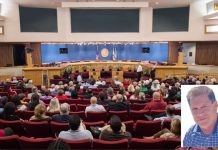
If you’re reading this, you’re likely a customer of Florida Power & Light (FPL). Like me, you’re probably tired of being constantly hit up for more money. It’s a perpetual barrage of FPL demands continually approved in Tallahassee by utility regulators known as the Florida Public Service Commission (PSC).
I recently wrote about FPL’s latest rate hike – an $811 million dollar increase over the next four years approved by the PSC. On the heels of that, the PSC gave the go ahead for FPL to charge us an additional $318 million for costs from Hurricane Matthew. Thankfully the storm passed 100 miles from land and the slower wind speeds caused minimal damage. That kind of cash sounds excessive.
I’m continually frustrated that we’re paying dearly for the mismanagement of FPL’s Turkey Point nuclear plant. First off, consumers have already paid $280 million in advance for two new reactors that likely will never be built.
Second, FPL has persistent, big problems with a contamination mess from the canals that cool the existing two reactors (Units 3 and 4), which continue to leach pollutants westward towards Miami Dade’s drinking water supply wells and eastward into Biscayne Bay threatening the drinking water for more than three million people.
This mess prompted the Monroe County Commission to recently pass a resolution asking FPL to “discontinue the use of the cooling canal system in favor of a more modern mechanical draft cooling tower system.” They cited “recent discoveries and potential impacts on Card Sound, Biscayne Bay, and the Florida Keys’ drinking water supply.” The stakes are big.
The most outrageous part is that FPL has known these canals were problematic since the early 1980s. No other place in the world uses an unlined, porous industrial sewer to cool water for an operating nuclear plant. It seems that since they can’t manage the existing reactors, why would we trust them to build and safely operate two new ones?
Hats off to the Miami-Dade County Commission who released a report last March detailing the threat on the bay side from the leaking cooling canals. They are collecting additional data to better understand the impacts of the pollution leaching into Biscayne Bay.
Miami-Dade County’s continued leadership is vital when Florida lawmakers and agencies like the Florida Department of Environmental Protection, the South Florida Water Management District and the PSC seem unwilling to stand up to the influence of FPL. This monopoly power company throws money around like drunken sailors giving hefty political contributions, hiring scores of lobbyists and fueling the revolving door of job offerings to scores of former regulators and decision makers.
So hold on to your wallet because with very little media attention late last year, FPL went to the PSC and got the OK to start collecting over $100 million for cleanup costs for the canals. Later this year, the PSC will determine if the expenses are warranted.
Over ten years, clean up costs are projected to be over $200 million despite no assurance that FPL’s experimental plan to remove the contaminated water will work. More importantly, FPL’s plan is not a solution to the problem they caused.
Pressing for a real solution, several concerned organizations (Southern Alliance for Clean Energy, National Parks Conservation Association, Tropical Audubon Society and Friends of the Everglades) filed a Clean Water Act lawsuit arguing that FPL has violated federal law by contaminating Biscayne Bay with pollutants from the cooling canals. The suit argues that the on-going contamination can only be stopped with the best technology, in this case cooling towers, instead of the failing cooling canal system, which is essentially an open industrial sewer.
I want the pollution to stop and I want a clean up plan that’ll work. The PSC should not allow FPL to conduct an experiment on our dime.
The hits just keep on coming! When does it end? When will our policymakers stand up to this out of control monopoly? As a captive customer with no choice about who provides your power, you should be mad.
There is one bright spot. Our new State Senator Jose Javier Rodriguez, who has often been a lone voice in disputes with FPL, has filed Senate Bill 974. If passed, it will give counties and cities some say in who bears the cost to repair environmental damage by a utility. Rather than leaving it to the PSC, a city or county could conduct a formal assessment on the environmental damage and weigh in on whether the utility made smart decisions leading up to the problem. Sounds reasonable to me.
Call your local legislators today. Demand they stand up to FPL and stop the blank check. SB 974 is a start.
At the least, it’s the beginning of a much-needed conversation.







Comments are closed.